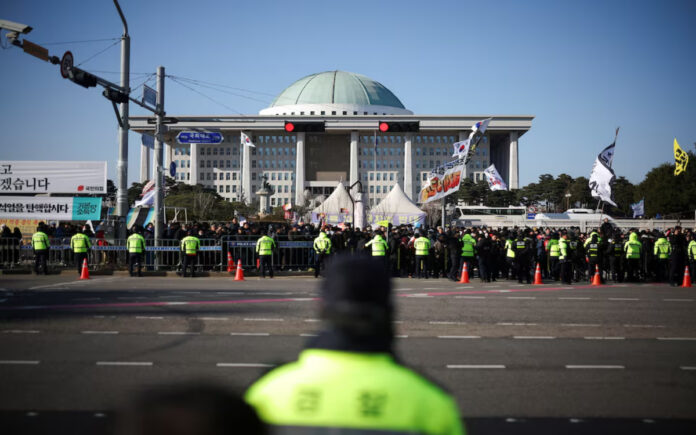Seoul: South Korean President Yoon Suk Yeol narrowly escaped an impeachment vote in parliament on Saturday, following his brief and controversial attempt to impose martial law earlier in the week. However, the leader of his own party, Han Dong-hoon, indicated that Yoon would eventually resign.
The impeachment motion, introduced by the opposition Democratic Party (DP), failed to gather enough support after Yoon’s People Power Party (PPP) boycotted the vote. The motion was eventually dismissed, as insufficient lawmakers participated in the vote. Despite the impeachment being unsuccessful, Han stated that the party had decided Yoon’s resignation was inevitable.
“The declaration of martial law was a clear and serious violation of the law,” Han said in a press conference. However, it was unclear whether his remarks reflected the views of the entire PPP, as no official response from Yoon had been issued.
Yoon’s martial law decree, announced late Tuesday, granted the military extensive emergency powers to eliminate what he described as “anti-state forces” and counteract political obstruction. The decision sparked outrage across the nation, prompting parliamentary members to defy military and police barriers, leading to the repeal of the order just six hours later.
Although Yoon’s martial law declaration was rescinded, it threw South Korea into its deepest political crisis in decades, casting a shadow over the country’s reputation as a thriving democracy. Yoon later addressed the nation in a televised speech, apologizing for his actions and accepting any potential consequences. However, he refrained from offering his resignation at that time.
Yoon expressed that he would leave his fate in the hands of the PPP, which Han interpreted as a tacit promise to step down. “The People Power Party will pursue an orderly departure of the president to minimize confusion for the people,” Han explained. He also noted that, until Yoon’s departure, the president would effectively be sidelined, with the prime minister consulting the party on managing state affairs.
The opposition, however, dismissed this approach as “absurd and illegal.” The DP declared that impeachment was the only constitutional path to remove the president from office, emphasizing that neither Han nor anyone else had the authority to remove Yoon unilaterally.
IMPEACHMENT MOVES For the impeachment motion to succeed, at least eight votes from Yoon’s PPP were required. However, when PPP lawmakers cast their votes for a separate motion and departed, only three members of his party voted in favor of impeachment.
The PPP rejected the idea of another impeachment, drawing a parallel to the 2016 impeachment of then-President Park Geun-hye. Park’s removal, following months of protests over an influence-peddling scandal, led to the disintegration of her party and a liberal victory in the subsequent elections.
“We cannot repeat the tragedy of paralysis of state affairs and suspension of constitutional government through the impeachment of the president,” PPP spokesperson Shin Dong-uk said after the failed vote. He added that Yoon had apologized and entrusted his future to the party, implying that the situation would be resolved without further disruption.
Despite the political turmoil, public protests have continued. Tens of thousands of demonstrators rallied in the streets outside parliament, demanding Yoon’s impeachment. A recent poll by Real Meter revealed that 73.6% of respondents supported impeachment, while 24% opposed it.
Protester Choi Yong-ho, 60, voiced his frustration with the failed impeachment, vowing to continue protesting until the situation was resolved. “We have to make our voices heard,” Choi stated.
YOON’S APOLOGY In his Saturday address, Yoon made his first public appearance since rescinding the martial law order. “I leave it up to my party to take steps to stabilize the political situation in the future, including the issue of my term in office,” he said. He promised that there would be no second attempt to impose martial law.
Also Read | Syria’s Assad Ousted by Rebels After Decades of Iron-Fisted Rule
However, Han reiterated that Yoon was no longer capable of performing his presidential duties. “His resignation is now unavoidable,” Han asserted. Earlier in the week, Han had called Yoon a “danger to the country” and insisted on his removal from power.
Despite this, almost all PPP members refrained from participating in the vote. One member who did vote expressed opposition to impeachment but also noted that he believed Yoon was unsuitable for office.
Also Read | U.S. House Prepares to Vote on $3 Billion Telecom Security Bill
If Yoon were to resign before completing his five-year term, which ends in May 2027, the constitution mandates a presidential election within 60 days of his departure.
South Korea has declared martial law over a dozen times since its establishment in 1948, with the most recent declaration occurring in 1980. Yoon’s martial law order, which targeted “anti-state forces” and pro-North Korean elements, included sweeping powers for the military to combat threats and address internal political opposition. Despite the repeal, the crisis remains a significant challenge for Yoon’s administration.



